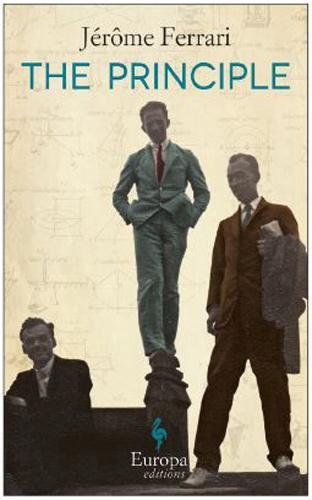 Reviewed by Mari Carlson
Reviewed by Mari Carlson
The Principle Paperback
by Jérôme Ferrari (Author), Howard Curtis (Translator)
Europa Editions
February 28, 2017, ISBN-13: 978-1609453527, Paperback: 144 pages
In The Principle, narrator Jérôme Ferrari (“I”), addresses physicist Werner Heisenberg as “you.” They play off each other like dueling measuring devices personifying Heisenberg’s uncertainty principle: that the more precisely one measures the position of a given point, the less precisely its momentum can be measured and vice versa. The narrator measures his own momentum as a writer trying to make his way in the aftermath of the discovery of quantum physics and nuclear power, while also trying to understand Heisenberg’s “position,” what his mental state must have been as he discovered what his work could mean. As the narrator draws Heisenberg forth from the past into his own present, Ferrari explores the enduring fundamentals that shape all our lives, through triumphs and setbacks, controversy and compromise, precision and immeasurability.
The book both begins and ends overlooking a magnificent landscape. First, early in his career, on the island of Heligoland, Heisenberg “looks over God’s shoulder,” then, after his return to Germany following WWII, he returns to the mountains and lakes, “a place where it’s impossible for God’s love to lie.” These bookends link themes present throughout the book, and bind the narrator and Heisenberg. Chapter titles name these themes – Positions, Speed, Energy, and Time – but the beautiful scenes show how Ferrari develops them. Coming back again and again to key phrases, such as those about God, as well as “the white rose, the almost inaudible sound of the silvery string,” and “master of Delphi,” Ferrari gives structure where “things have no core.” The repeated phrases point to the abiding questions prodding the narrator and Heisenberg as they both build careers (or, in the narrator’s case, fail to build) during tumultuous times: what can I accomplish with the elements at hand and what is it all for? Overlooking Earth’s grandeur provides perspective.
Perhaps, by working on the atomic bomb, Heisenberg undermines the beauty he lives for; Ferrari refuses to let judgement be the last word. Instead, he tells a story, not unlike a letter, the overall effect of which is a sweeping, panoramic view of both the internal workings of one’s soul, as well as the wide scope of science in modern history, in short, the quantum effect. On that note, I’ll end with the book’s last line, “I’ve never seen anything more beautiful in my life.”
About the reviewer: When not reading books and writing reviews, Mari Carlson teaches violin lessons and practices and performs with chamber and symphony orchestras and folk ensembles in Minneapolis, MN and Eau Claire, WI.